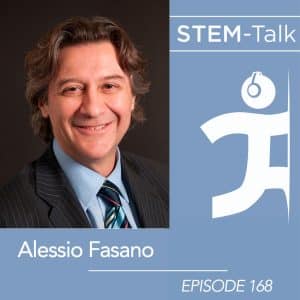STEM-Talk: Alessio Fasano on the roots of, treatments for celiac disease
Dr. Alessio Fasano, who is considered the world’s leading expert in celiac disease and gluten-related disorders, returns for his second appearance on STEM-Talk. The interview is available now where you listen to podcasts.

Dr. Alessio Fasano makes his second appearance on STEM-Talk.
As he tells co-hosts Dr. Ken Ford and Dr. Marcas Bamman, he went to medical school with the idea of changing the world. And pediatrics, for him, was a love-at-first-sight way to accomplish this lofty goal.
“I realized from the very beginning in medical school that dealing with kids was going to be more fun and interesting,” Fasano says.
When it came time to choose a mentor, he chose someone who had come back from the University of Chicago, where he’d studied diarrheal diseases.
“I thought that was unglamorous. I wanted to save the world and study cancer or HIV. He educated me. He said that every year 5 million kids would die of diarrheal disease, so if I wanted to do something impactful, I should focus on that.”
Ever since, Fasano has been doing work that could have a profound impact of the health and well-being of people. He is director of the Mucosal Immunology and Biology Research Center at Massachusetts General Hospital. In addition to celiac disease and gluten-related disorders, his research is also focused on the microbiome, intestinal permeability and autoimmune disorders, which he discussed in his first interview on STEM-Talk, episode 20.
Since Alessio’s first appearance on STEM-Talk in 2016, he has published two books, “Gluten Freedom” and “Gut Feelings: The Microbiome and Our Health,” which we discuss in today’s interview.
Also in this episode we talk about:
- Fasano’s new project to bring together an international consortium of researchers and scientists for a long-term study that will follow infants who are genetically at risk of developing celiac disease.
- His early career working on cholera, where he discovered the zonula occuldens toxin, the bacteria that causes cholera.
- How the discovery of zonulin, which is the molecule that modulates gut permeability in humans, led Fasano to investigate celiac disease, which is triggered by gluten.
- Why the medical community, historically, has not taken celiac disease seriously. Although just 2 million Americans have celiac disease, an estimated 20 million Americans suffer from gluten sensitivity.
- The progress being made to develop pharmacological interventions for celiac and much more.
IHMC is a not-for-profit research institute of the Florida University System where researchers pioneer science and technology aimed at leveraging and extending human capabilities. IHMC researchers and staff collaborate extensively with the government, industry and academia to help develop breakthrough technologies. IHMC research partners have included: DARPA, the National Science Foundation, NASA, Army, Navy, Air Force, National Institutes of Health, IBM, Microsoft, Honda, Boeing, Lockheed, and many others.
Latest News
- IHMC Unveils New Leadership Team to Build on Legacy of Innovation
- Ocala Research Showcase highlights IHMC’s footprint and impact
- STEM-Talk wins Signal Award in Health & Wellness Podcasts
- STEM-Talk: Rudy Tanzi on genetics, aging, and the hallmarks of Alzheimer’s
- National Institutes of Health award for $7.7 million to determine how people over 60 attain the health benefits of exercise
- STEM-Talk: Anurag Singh on aging, exercise, and urolithin-A
- STEM-Talk: Kevin Tracey on bioelectrical medicine and inflammation’s toll
- Evening Lectures focus on human performance, work culture and much more
- Science Saturdays schedule for Fall 2024 released

